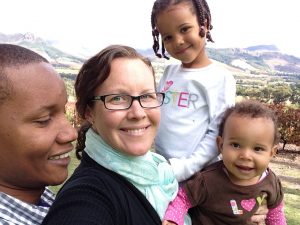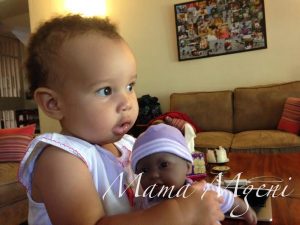
by Tara Wambugu | Jun 17, 2015 | 2015, Africa, Family, Kenya, Living Abroad, Motherhood, Parenting, Tara Wambugu, World Interviews
Where in t he world do you live? And, are you from there?
he world do you live? And, are you from there?
I live in Nairobi, Kenya. I was born and raised in the US, but I’ve been living abroad for the better part of the past 15 years.
What language(s) do you speak?
English is my mother tongue, and I speak fluent French, as well as (very) basic Kiswahili.
When did you first become a mother (year/age)?
I first became a mother in 2011 when I was 34 years old. I now have two daughters.
Are you a stay-at-home mom or do you work?
Much to the surprise of many of my friends and former colleagues, I decided to stay home with my kids. I feel incredibly lucky to have been able to stay home with them, and being their mom is the most rewarding (and challenging!) job I’ve ever done.
Why do you blog/write?
I started blogging a couple of years after I moved to Nairobi. As I settled in to my adopted home, I realized that I had gained a great deal of insider information about raising a family in Nairobi. A good friend often asked for my advice about life with kids in Kenya and frequently told me, “You should start a blog!” I finally listened to her, and Mama Mgeni was born. “Mgeni” is a word in Kiswahili meaning foreigner, guest, visitor or stranger. I might still be mgeni, but Kenya has very much become my home!
What makes you unique as a mother?
To be honest, I don’t feel very unique. Like all mothers, I adore my children, I can be driven completely mad by my children, I want the best for my family, and I often fear that I’m messing it all up. Motherhood brings us all together, no matter what culture we’re from or what part of the world we live in.
What do you view as the challenges of raising a child in today’s world?
Today’s families have very fast-paced lives, with a constant onslaught of electronic entertainment. It can be a huge challenge to slow down and do things together as a family, without being distracted by phones, computers or TV. Parents need to set a good example, though often we parents are just as mesmerized by gadgets as our children are.
How did you find World Moms Blog?
I found World Moms Blog through reading fellow contributor Kim Siegal’s blog, Mama Mzungu. I clicked through, and I’ve been a fan ever since!
This is an original post to World Moms Blog by Tara Wambugu, our new contributor from Kenya.
ABOUT TARA
Tara Wambugu is a wife, a mother of two, and a Kenya-based lifestyle blogger covering parenting, family life, travel, and more. A former aid worker, Tara has worked in various countries in Europe, Central Asia, Africa, and Central America. She is now a stay-at-home mom living in Nairobi with her husband and their two sassy little girls. Follow Tara and her family’s adventures on her blog, Mama Mgeni, and connect with her on Facebook, Twitter and Instagram.
Tara Wambugu is a wife, a mother of two, and a Kenya-based lifestyle blogger covering parenting, family life, travel, and more. A former aid worker, Tara has worked in various countries in Europe, Central Asia, Africa, and Central America. She is now a stay-at-home mom living in Nairobi with her husband and their two sassy little girls. You can follow Tara and her family’s adventures on her blog, Mama Mgeni.
More Posts - Website
Follow Me:






by Tara Wambugu | Mar 25, 2015 | 2015, Africa, Body Image, Guest Post, Identity, Kenya, Kids, Race, Tara Wambugu, Toys, World Motherhood, Younger Children

Today we welcome a guest post from Tara, who is writing from Kenya. You can follow her adventures in parenting at mamamgeni.com, where she blogs about raising her family with one foot in the expat world and the other firmly planted in her husband’s homeland. As she recently discovered, finding a black doll was no easy task–in either place.
“Mommy, there are three black people and one white person in our family.” My eldest daughter enjoys pointing out the obvious. She’s referring to me (white American), my husband (black Kenyan), and her baby sister (mixed-race, just like she is). She fully identifies as black, and has recently been expressing interest in race and skin color. We want our kids to explore their cultural and racial identities, and we try to ensure our toys and books reflect the richness of both of our cultures.
My youngest recently turned one, and we decided to get her a baby doll for her birthday. More specifically, we wanted to get her a black baby doll. Should be easy, right? We live in Kenya. No, not easy. THERE ARE ALMOST NO BLACK DOLLS HERE. Whenever you see Kenyan kids playing with dolls, they are almost always little white dolls with blonde hair. White baby dolls, white Barbies, white, white, white. You can find some nice black dolls handmade out of cloth, but they tend to be mommy dolls with babies on their backs. I was looking for a realistic baby, something she could cuddle and take care of, a baby of her own.
Since I was having no luck finding what I was looking for in Kenya, I decided to look for a black baby doll while I was in the US on a recent visit. My family lives in a greater metro area that is over 50% African American. I went to a local department store, and sought out the doll section. I expected to see a choice of dolls from different ethnicities (at least black and white dolls, given the racial make-up of the city). I was wrong – there was nothing but white dolls. Row upon row of white dolls. Blonde-haired, blue-eyed white dolls. Dozens of pink boxes with white dolls inside. Not the kind of dolls I was looking for.
Why was this so hard?
In the end, I decided to search online for a black baby doll, and found one that I loved. My daughter loves it too… She walks around the house, patting her baby’s back, swaying back and forth with a big grin on her face. I had some Kenyan colleagues at my house recently, and they asked where I had found our black doll. I told them my story, and together we lamented the fact that there were so few black dolls available in a predominantly black country.
There is a market for this kind of toy here, and someone is missing out on a serious business opportunity!
It is really important to me that my children have dolls and books that reflect who they are. My eldest is always looking for people who have skin like hers, or hair like hers.
She yearns to identify with a group of people. Having black baby dolls and books featuring black characters makes a difference. Dolls may be “just toys,” but they can mean so much more to a young girl who longs to connect and identify with others like her. What are dolls like in the country where you live? Do they reflect how the people look, or are they different in any way?
This is an original post to World Moms Blog by Mama Mgeni of Kenya.
Photo credit to Mama Mgeni.
Tara Wambugu is a wife, a mother of two, and a Kenya-based lifestyle blogger covering parenting, family life, travel, and more. A former aid worker, Tara has worked in various countries in Europe, Central Asia, Africa, and Central America. She is now a stay-at-home mom living in Nairobi with her husband and their two sassy little girls. You can follow Tara and her family’s adventures on her blog, Mama Mgeni.
More Posts - Website
Follow Me:






 he world do you live? And, are you from there?
he world do you live? And, are you from there?










